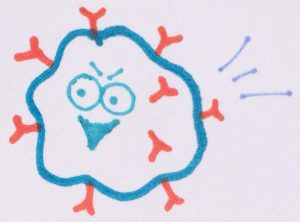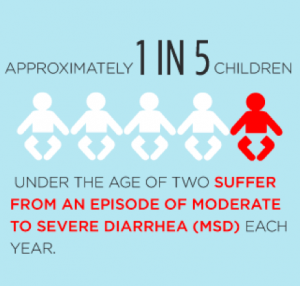Rotavirus Vaccine (RV)
My one year old loves to stick everything she can into her mouth, including her fingers, toys, things that aren’t toys, the shopping cart handle–what I’m eluding to here is that children aren’t always the most clean creatures. However, they are cute, and we as parents want to protect them. It’s because of vaccines that we actually CAN protect them from some of the worst diseases. There’s one horrible virus in particular that’s highly contagious and loves to live on the surfaces of infected items, and that’s the rotavirus.
The way that rotavirus gets on to the surfaces of infected items isn’t pretty. The virus lives in the intestines, and then passes itself on to its next victim via a sick person’s bowel movement. This means that through improper hand washing, infected stool makes its way onto surfaces, and then once the infected surface is touched by a child (or anyone) and the child puts his fingers into his mouth, that child also becomes infected. Hey, I’m just going to say it: to get infected you must ingest poop. What an utterly horrible thought!
I’m not going to go into a rant about hand washing, because that’s for someone else’s blog. However, washing of hands after say, the changing of a diaper, is essential to keeping the rotavirus at bay.

Should your child pick up this nasty virus you might notice some or all of these symptoms:
- Fever
- Nausea and vomiting followed by abdominal cramps
- Frequent and watery diarrhea.
- Cough
- Runny nose
Often times the diarrhea caused by the rotavirus is so severe that the child will become dehydrated (extreme loss of fluids) very quickly. The signs that your child has become severely dehydrated are:
- Incredible thirst
- Restlessness
- Lethargy (just “sick-looking”, laying around, low energy)
- Sunken eyes
- Dry mouth/tongue/skin
- Dry diaper for several hours or less frequent trips to the bathroom for older children
Should your child develop extreme dehydration, it would be safe to assume he may be spending the night or longer in the hospital getting IV fluids. In fact, the rotavirus is the culprit for 55,000 cases of hospitalizations for diarrhea-related dehydration in children under five each year in the United States.2


(Pictures courtesy of www.rotacouncil.org)
Fortunately, these trips to the hospital can be prevented. Actually, it is quite easy to prevent getting some of the worst strains of the rotavirus, altogether: through vaccination.
There are two vaccines used currently in the United States to vaccinate children against rotavirus. These two vaccines are called Rotarix® and RotaTeq®.
Great news! Both of these vaccines are given to the baby orally, meaning there is no shot involved!
Prior to 1999, there was a rotavirus vaccine called Rotashield on the market that was linked to intussusception. This means that part of the intestine slides into itself, much like a telescope slides together. If that doesn’t sound pleasant to you, it’s because it’s not. However, RotaTeq® nor Rotarix® have nearly no link to intussusception. The risk is so small that somewhere between 1 in 20,000 to 1 in 100,000 US infants have serious complications.2
Here’s a little comparison of the two vaccines, which are very similar:
RotaTeq® (produced by Merck)
- A 3-dose series given at 2 months, 4 months, and 6 months old
- 85% protection against severe rotavirus after completed series of vaccines
- Can be given to premature infants (25–36 weeks’ gestation)3
Rotarix® (produced by GlaxoSmithKline)
- A 2-dose series given at 2 months and 4 months old
- 98% protection against severe rotavirus after completed series of vaccines
- Well-tolerated in premature infants (29–36 weeks’ gestation)3, however the protection rates haven’t been properly studied.
It is recommended that your child be given this vaccine (either one) before the age of 15 weeks old because there have not been sufficient studies done to determine the safety of the vaccine in infants older that that, and the entire series of the vaccine should be completed by 8 months of age.1 It is also recommended that with each vaccine the dosing should be two months apart with no longer than 4 months between doses until the series is completed.
The rotavirus vaccine will most likely be given to your child along with other routine vaccines, however you need not worry about your child’s safety. Both rotavirus vaccines have been deemed safe when administered along with the diphtheria–tetanus–acellular pertussis vaccine (DTaP) vaccine, Haemophilus influenza type b vaccine (Hib), inactivated polio vaccine (IPV), hepatitis B vaccine, and pneumococcal conjugate vaccine.3 There have been studies that show that when given all or any of these vaccines together, proper immune responses are made to each vaccine.1 The response between the rotavirus and influenza vaccine given at the same time has not been properly studied, however according to the CDC, the ACIP (Advisory Committee on Immunization Practices) has stated that studies have been conducted showing that the two different TYPES of vaccines can be used together with no interactions. Meaning, the flu vaccine, which is an inactivated type vaccine, and the rotavirus vaccine, which is a live type vaccine can be used together.1
Most babies that get the rotavirus vaccine never have any problems with it, however there is a slight chance your child may become irritable, or have a mild case of diarrhea/vomiting after getting a dose of rotavirus vaccine.
Finally, you can rest assured that neither rotavirus vaccine contains thimerosal or any other preservative.
My daughter was fully vaccinated against the rotavirus and she is doing great. She licked that vaccine down like it was candy and experienced no side effects. The benefits of this vaccine are tremendous and the side effects minimal and rare, however there are several reasons not to give your child this vaccination. For instance, if your child receives a dose of the vaccine and has an allergic reaction to the vaccine, do not continue to give your child the following doses. Also, babies who have had bowel blockage such as intussusception shouldn’t get the vaccine, as well as if your child has been diagnosed with severe combined immunodeficiency syndrome (SCID).1
What to do if your child has a serious reaction to a vaccine.
If your baby is otherwise healthy, the rotavirus vaccine is a great gift you can give your child’s immune system!
Resources:
- Centers for Disease Control and Prevention. www.cdc.gov
- Kids Health. www.kidshealth.org
- NPS Medicinewise. www.NPS.org
Pictures are Vaccine Mom original Art.
One thought on “Rotavirus Vaccine (RV)”
Comments are closed.




Great information, and real public service. I look forward to reading more from you.